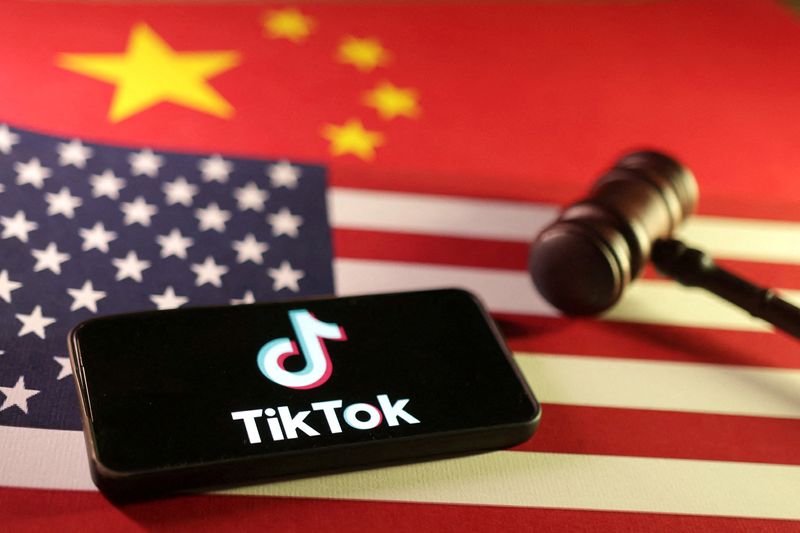Supreme Court hears arguments over looming US ban on TikTok By Reuters

By Andrew Chung, John Kruzel and David Shepardson
WASHINGTON (Reuters) – The Supreme Court heard arguments on Friday over the legality of a statute that would ban or force the sale of TikTok by Jan. 19 in the United States in a case that pits free speech rights against national security concerns over the widely used short-video app owned by Chinese company ByteDance.
TikTok and ByteDance, as well as some users who post content on the app, have challenged a law passed by Congress with strong bipartisan support last year and signed by outgoing Democratic President Joe Biden, whose administration is defending it in the case.
During the arguments, the justices probed the nature of TikTok’s speech rights and the government’s concerns over national security. The arguments were ongoing. A lower court rejected the argument made by the law’s challengers that it violates the U.S. Constitution’s First Amendment protection against government abridgment of free speech.
The Supreme Court’s consideration of the case comes at a time of rising trade tensions between the world’s two biggest economies. Republican Donald Trump, due to begin his second term as president on Jan. 20, opposes the ban.
Noel Francisco, a lawyer for TikTok and ByteDance, told the justices that the app is one of the most popular speech platforms for Americans. Francisco said the real target of the law “is the speech itself – this fear that Americans, even if fully informed, could be persuaded by Chinese misinformation. That, however, is a decision that the First Amendment leaves to the people.”
“In short, this act should not stand,” Francisco said of the law.
Francisco cited Trump’s stance on the case.
Trump on Dec. 27 called on the Supreme Court to put a hold on the Jan. 19 deadline for divestiture to give his incoming administration “the opportunity to pursue a political resolution of the questions at issue in the case.”
Francisco asked the justices to, at a minimum, put a temporary hold on the law, “which will allow you to carefully consider this momentous issue and, for the reasons explained by the president-elect, potentially moot the case.”
The Supreme Court was weighing competing concerns – about free speech rights and about the national security implications of a social media platform with foreign owners that collects data from a domestic user base of 170 million Americans, about half the U.S. population.
Conservative Chief Justice John Roberts pressed Francisco on TikTok’s Chinese ownership and the findings of Congress.
“Are we supposed to ignore the fact that the ultimate parent is, in fact, subject to doing intelligence work for the Chinese government?” Roberts asked. “It seems to me that you’re ignoring the major concern here of Congress – which was Chinese manipulation of the content and acquisition and harvesting of the content.”
The Justice Department has said TikTok poses a grave threat to U.S. national security because of the risk that China could use this immense trove of data on Americans for espionage or blackmail, or secretly manipulate content that they view on the app to serve its interests.
The platform’s powerful algorithm feeds individual users short videos tailored to their liking. TikTok has said that the ban would hit its user base, advertisers, content creators and employee talent. TikTok has 7,000 U.S. employees.
‘A DIRECT BURDEN’
Conservative Justice Clarence Thomas asked Francisco what is TikTok’s speech at issue in the case.
“TikTok, you honor, uses an algorithm that, in its view, reflects the best mix of content. What the act does is it says TikTok cannot do that unless ByteDance executes a qualified divestiture. That’s a direct burden on TikTok’s speech,” Francisco said.
Francisco told conservative Justice Amy Coney Barrett that the algorithm represents editorial discretion.
Thomas challenged Francisco’s argument that TikTok’s U.S. operations have free speech rights.
“You’re converting the restriction on ByteDance’s ownership of the algorithm and the company into a restriction on TikTok’s speech. So why can’t we simply look at it as a restriction on ByteDance?” Thomas asked.
Liberal Justice Elena Kagan noted that TikTok does have First Amendment rights.
“I guess my question is: how are those First Amendment rights really begin implicated here?” Kagan asked Francisco. “This statute says the foreign company has to divest. Whether or not that’s feasible, however long it takes, TikTok still has the ability to use whatever algorithm it wants, doesn’t it?”
“No, you honor,” Francisco responded, noting the looming deadline.
“In 10 days, TikTok wants to speak. In 10 days, because this law was passed, TikTok cannot speak unless ByteDance executes a qualified divestiture,” Francisco said.
The Justice Department has said the law targets control of the app by a foreign adversary, not protected speech, and that TikTok could continue operating as-is if it is freed from China’s control.
Francisco raised a hypothetical that if the Chinese government had taken the children of Washington Post owner Jeff Bezos hostage to force him and his newspaper to publish “whatever they wanted on the front page of the Post, so China effectively has total control.”
“I still don’t think that Congress could come in and tell Bezos either sell the Post, or shut it down, because that would violate Bezos’ rights and the Washington Post’s rights,” Francisco said.

Francisco emphasized the impact of allowing Congress to ban TikTok – “which means that the government really could come in and say, ‘I’m going to shut down TikTok because it’s too pro-Republican or too pro-Democrat, or won’t disseminate the speech I want, and that would get no First Amendment scrutiny by anybody. That cannot possibly be the case.”
TikTok, ByteDance and the app users, seeking an injunction to halt the ban, are appealing the U.S. Court of Appeals for the District of Columbia Circuit’s Dec. 6 ruling upholding the law.




